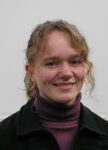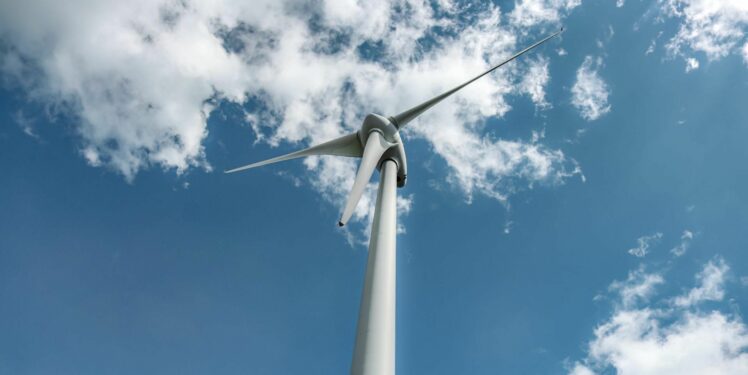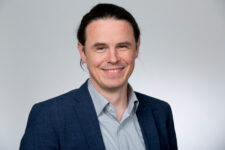The expansion of wind energy, along with other renewable energy sources, plays a crucial role in achieving the goal of climate neutrality globally. Yet the more wind turbines are connected to the grid, the more advanced become the requirements to control them. Accordingly, well-educated professionals and specialists are needed to supervise and manage those systems.
The online Master’s in Wind Energy Systems (M.Sc.) at the University of Kassel in partnership with Fraunhofer IEE trains students worldwide to become specialists in mechanical and electronic operations and interaction of wind turbines.
We met for an expert interview with the lecturers Melanie Hau and Dr. Boris Fischer from Fraunhofer IEE to learn about their field of study, developments in research and practice and how this is taught in the Wind Energy Master’s program.
What do you teach in the online-Master Wind Energy Systems (M.Sc.)?
Melanie:
Boris and I entered the Master’s program as lecturers in 2017 to teach the module “Control and Operational Management of Wind Farms”. We split this course into two parts, because my field of interest and research covers the wind park control and Boris research is dedicated to wind turbine control.
Tell us more about your field of research. What is wind park and wind turbine control?
Melanie:
I have been conducting research in the field of wind park control over the last 10 years. Wind Park Control addresses the behavior of wind parks towards the grid. To explain it simply, we look at the point where the park is connected to the grid. The grid operators set certain requirements such as voltage specifications or power gradients. Wind turbines in a wind park then must be managed so the correct value of reactive or active power reaches the point of connection. Boris research on the other hand focuses on wind turbine control. His expertise is directed to the generator and pitch control of individual turbines. Thereby the aim is to optimize the energy yield and to limit the power in order to protect the turbine in case of high winds.
Boris:
The interactions between our two fields of research have become closer and more relevant. Wind energy is a growing industry, and the number of wind turbines and other renewable energy sources in the energy system is constantly growing. In the future, the main objective of wind turbines control will no longer be to maximize energy yield, as it has been in the past, but rather to take into account the constraints of the power system in terms of economic optimization and grid integration. This needs to be managed by specialists through supervision and distribution.
What was your specific motivation to bring your research knowledge and interests into the teaching of international master students in wind energy?
Boris:
It is important to have well-trained people in the field and I am very happy that I can share my expertise. For me personally it is also good to reflect the basics of my field of study. And of course, teaching is fun!
Melanie:
Wind energy to me is a solution technology – it gives us a solution on the problem of climate crisis. In return this means we need more wind energy all around the world. This requires well-trained people globally. I personally enjoy working with international students because it helps me to stay open-minded and gain the perspective on wind energy of other parts in this world.
How do you like teaching international students. What have you learned from your students and their view on wind energy systems?
Boris:
I think online teaching is great because it gives the opportunity to meet and educate people worldwide. We have a great organizing team that gives us the chance to concentrate on our lectures. Our lectures are live-streamed and recorded giving students the opportunity to engage directly during the lecture as well as the flexibility to view the lecture according their schedule at any time at any place.
Melanie:
I always ask our students what the situation is like in their countries, for instance are there grid codes or which problems they face. I remember this one time when a student gave a presentation on blackouts in his home country Australia. This was very surprising and interesting for our students as well as for us.
You are interested in studying the online-Master in Wind Energy Systems (M.Sc.)?
Visit our website and find out more about the program and application process!
You are both experiences scientist. How do you bring your research knowledge into the teaching of international students?
Boris:
The lecture is mainly about teaching the basic methods. Some of our students have no background in the controlling of wind turbines and farms. Therefore, it is very important for us to pass the basic methods and tools on to the students.
Melanie:
During class, we also let our students work with our model.
For example, in my part they design a very simple wind park controller with a model that I have been using for my research also. This gives real life to the theory which helps a lot to understand the theory better.
As you have mentioned before, wind energy needs specialists if the ambitious expansion targets are to be achieved worldwide. Where do you see the need for specialists in your research field?
Boris:
We need control engineers that have a broad background in electrical as well as in mechanical topics. These worlds, the mechanical domain at the single turbines and the electrical power system are growing together. Control engineers bring the different parts of the whole system together. As the technology is becoming richer and richer, the interconnections between the different parts of the system become more complex and the control system becomes more relevant. In the future we will have hybrid parks with electrolysis and batteries, so its good to have a broad spectrum regarding physical domains and electrical as well as mechanical technologies.
What recommendation would you like to give to future students who want to educate themselves in the field of wind energy?
Melanie:
The master program provides a very broad spectrum of topics in the wind energy field. This gives you the opportunity to look into many different technologies which enables you to understand the system of wind energy. Later on, you can specialize in one of these fields, but you will always profit from the knowledge of the others so you can always talk to the other departments.
Boris:
I would additionally recommend the students to concentrate on learning methods and tools rather focusing on facts and figures. Take as much knowledge as you can because in the education phase you have time to get really deep into the subject. Also, we are here to help you understand it!
Our experts

Melanie Hau
Fraunhofer-Institut für Energiewirtschaft und Energiesystemtechnik IEE
Dr. Boris Fischer
Fraunhofer-Institut für Energiewirtschaft und Energiesystemtechnik IEE
Jutta Haubenreich ist seit 2009 in wechselnden Rollen bei Fraunhofer Academy tätig. Sie war u.a. für das übergreifende Marketing der Fraunhofer Academy und für die Betreuung und Vermarktung von Fraunhofer-Weiterbildungsprogrammen im Bereich Energie und Nachhaltigkeit zuständig. Aktuell betreut sie insbesondere die Fraunhofer Wasserstoff Education Community. Von 2011 bis 2017 war sie Projektleiterin und Koordinatorin des BMBF-Verbundprojektes »mint.online: Berufsbegleitende Studienangebote in MINT-Fächern«.
Von 2015 bis 2022 promovierte sie berufsbegleitend am Institut für Kommunikationswissenschaft und Medienforschung der LMU München zum Thema »Der Einfluss des Fernsehens auf Bildungsmotivation und -entscheidung«.



